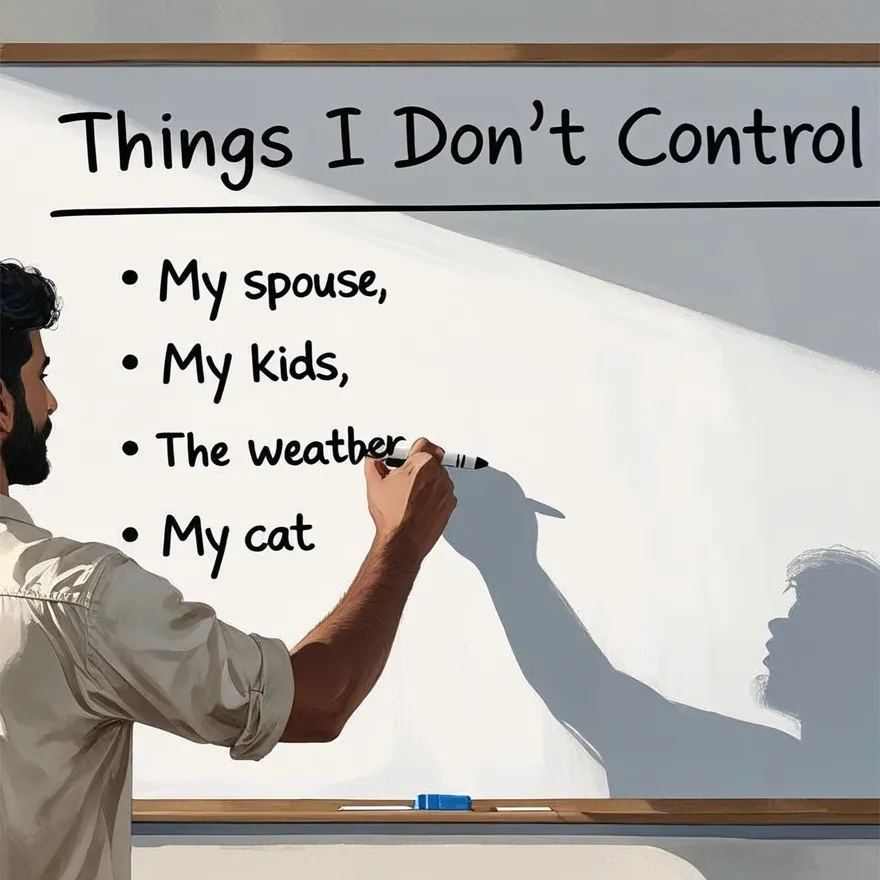Hidden Brain • Hidden Brain Media

Episodes

The Path to Enough
In this episode of Hidden Brain, Anna Lembke explains how the brain maintains a balance between pleasure and pain, and how this balance can become disrupted through excessive pleasure-seeking behaviors. She describes how the brain's dopamine system works like a seesaw, and how activities ranging from substance use to digital media consumption can create addictive patterns that affect mental health.
The discussion covers practical approaches to managing compulsive behaviors, including "self-binding" techniques and the strategic use of mild discomfort to reset the brain's reward system. Lembke examines how modern society's easy access to pleasurable activities contributes to addiction, using examples from smartphone use in schools to her own experience with romance novels to illustrate the sometimes blurry line between healthy enjoyment and problematic behavior.
Dec 15, 2025

The Paradox of Pleasure
In this episode of Hidden Brain, Dr. Anna Lembke examines how modern society has transformed ordinary behaviors into potentially addictive activities. She explores how increased access, quantity, and novelty in activities like shopping, gambling, and even reading can lead to compulsive behaviors, sharing examples from both her patients and personal experience to illustrate these patterns.
The episode delves into the neuroscience of pleasure and pain, explaining how constant stimulation of the brain's reward pathways can lead to decreased dopamine production. This biological process helps explain what Lembke calls the "plenty paradox"—the phenomenon where people in materially wealthy societies often experience higher rates of depression and anxiety, finding themselves unable to enjoy simple pleasures despite having access to more sources of stimulation than ever before.
Dec 8, 2025

Murder Mystery
In this episode of Hidden Brain, host Shankar Vedantam explores why humans are drawn to dark and violent stories despite valuing kindness and morality. The discussion examines how this attraction stems from evolutionary roots, with researcher Coltan Scrivner explaining how "morbid curiosity" helps humans learn about potential dangers in a safe, controlled environment—similar to how prey animals study predators from a distance.
The episode challenges common misconceptions about people who consume dark media, presenting research that shows horror fans demonstrate normal levels of empathy and often display greater resilience during real-world crises. Through examples like increased viewership of pandemic-related movies during COVID-19, the discussion reveals how engaging with threatening scenarios through media can help people develop coping mechanisms for real-life challenges.
Dec 1, 2025

Parents: Keep Out!
In this episode of Hidden Brain, guest Peter Gray examines how children's play and independence have changed from hunter-gatherer societies through modern times. Drawing from his research and personal experiences, Gray explores the stark differences between the unsupervised, self-directed play that children enjoyed in the past and today's highly structured, adult-supervised activities.
The discussion delves into how current parenting and educational approaches affect child development, with Gray highlighting correlations between decreased independent play and increased anxiety and depression in school-aged children. The episode covers potential solutions for restoring unstructured play, including ways parents can gradually increase children's independence and how schools can create environments that support self-directed activities.
Nov 24, 2025

Why Following Your Dreams Isn't Enough
In this episode of Hidden Brain, the discussion centers on the interplay between visionary thinking and practical execution in successful ventures. Through examples like the Fyre Festival disaster and North Korea's "Hotel of Doom," the episode examines how grand visions can fail without proper planning, while also highlighting success stories like the California DMV's implementation of online services.
The episode also explores how organizational hierarchies can disconnect leaders from reality and create an "illusion of competence." The conversation extends to bridging political divides, using examples like Utah's "Disagree Better" initiative to demonstrate how focusing on shared concerns and asking thoughtful questions can lead to more productive dialogue across ideological lines.
Nov 10, 2025

How Nature Heals Us
In this episode of Hidden Brain, Marc Berman and Shankar Vedantam explore how nature affects our cognitive function and mental well-being. Their discussion covers research showing that nature exposure improves attention, boosts cognitive performance, and reduces stress. Beyond these immediate effects, they examine how natural elements in healthcare settings can aid patient recovery and reduce pain medication needs.
The conversation delves into why nature has such profound effects on humans, from the way our brains process natural patterns to how effortlessly nature captures our attention compared to urban environments. Berman shares insights about incorporating nature-inspired elements into architectural design and introduces practical solutions for increasing nature exposure in daily life, including technology that helps urban dwellers find greener walking routes.
Nov 3, 2025

Reframing the Battle of Wills
In this episode of Hidden Brain, host Shankar Vedantam and guest Stuart Ablon examine why traditional behavior modification methods that rely on rewards and punishments often fail to create lasting change. They explore the concept that behavioral issues stem not from a lack of motivation or willpower, but from missing foundational skills such as impulse control and working memory.
The discussion introduces Collaborative Problem Solving (CPS) as an alternative approach to behavior modification. This method focuses on building skills through understanding and cooperation rather than imposing consequences. The summary covers research on CPS implementation in various settings, including psychiatric hospitals and juvenile detention centers, and presents findings on its effectiveness compared to conventional behavioral interventions.
Oct 27, 2025

Love 2.0: How to Move On
In this episode of Hidden Brain, psychologist Antonio Pascual-Leone examines the complex process of moving on after a relationship ends. Through his own experience of trying to win back an ex-girlfriend, Pascual-Leone illustrates common post-breakup behaviors and explains why grand gestures often serve as avoidance mechanisms rather than genuine attempts at reconciliation.
The episode explores therapeutic strategies for processing breakups and gaining closure, including writing unsent letters and conducting empty chair conversations. Pascual-Leone's research reveals how the way people tell their breakup stories can impact their mental health outcomes, and he discusses the importance of grieving not just the relationship itself, but also the unrealized hopes and dreams it contained.
Oct 20, 2025

Love 2.0: Reimagining Our Relationships
In this Hidden Brain episode, Shankar Vedantam and his guests examine how marriage has evolved from a practical arrangement focused on resource sharing and political alliances to a relationship based on romantic love and personal fulfillment. Through historical examples and research, they explore how the 19th century marked a pivotal shift in marriage expectations, while highlighting how gender roles and economic factors influenced these changes.
The discussion delves into the psychological challenges faced by modern couples, introducing the concept of marriage "suffocation" - where partners expect their relationship to fulfill an increasingly complex set of needs, from basic security to self-actualization. The guests share insights about managing these expectations and explain how couples can improve their relationships by reframing their marriage narratives and expanding their emotional support networks beyond their spouse.
Oct 13, 2025

Love 2.0: How to Fix Your Marriage, Part 2
In this episode of Hidden Brain, James Cordova examines how couples can improve their relationships by moving beyond the blame game. He explores why partners often prioritize winning arguments over understanding each other, and introduces the concept of "eating the blame" - a practice of acknowledging one's own faults during conflicts instead of avoiding responsibility.
Cordova explains that accepting partners as they are, rather than trying to change them, creates space for natural problem-solving and deeper intimacy. Using examples and metaphors, including comparing argumentative couples to opposing fire hoses, he illustrates how empathy and mutual understanding can transform relationship dynamics. The discussion includes insights about maintaining mindfulness during conflicts and adapting to relationship changes over time.
Oct 6, 2025

Love 2.0: How to Fix Your Marriage, Part 1
In this episode of Hidden Brain, host Shankar Vedantam explores relationships and personal passions with guests James Cordova and Jon Jachimowicz. Cordova delves into why attempts to change one's partner often backfire in relationships and suggests alternatives for addressing relationship challenges. Jachimowicz explains how passion requires active maintenance, noting common signs of declining passion and strategies for rekindling it.
The episode also examines how different cultures approach and express passion, particularly in career contexts. Through conversations with researchers Kira Schabram and Erminia Ibarra, the discussion covers practical approaches to discovering and maintaining passion, including the concept of trying new roles and gathering feedback. The guests share insights on finding meaning both within and outside of work, emphasizing the importance of maintaining a growth mindset while pursuing interests.
Sep 29, 2025

Passion vs. Paycheck
Hidden Brain examines the evolving concept of work as a calling, tracing its transformation from religious vocations during the Protestant Reformation to today's secular careers. Through Jennifer Tosti-Kharas' 20-year research, the episode explores how viewing work as a calling affects job satisfaction, performance, and personal well-being.
The episode presents case studies of individuals who pursued their callings, including Paul Gauguin, Marie Curie, and Oprah Winfrey, to illustrate both the benefits and potential drawbacks of this mindset. While people with strong callings often show greater resilience and commitment to their work, they may also experience career tunnel vision, resist feedback, and become vulnerable to exploitation and burnout. The discussion highlights how the emotional impact of an unfulfilled calling can parallel that of a failed romantic relationship.
Sep 22, 2025
Create Summaries for anything on the web
Download the Shortform Chrome extension for your browser


It's Not My Fault!
In this Hidden Brain episode, neuroscientist Emily Falk and host Shankar Vedantam examine why people often react defensively to feedback and suggestions for improvement. They explore how our brains naturally associate "me" with "good," creating an inherent resistance to criticism, even when we believe in the concept of self-improvement.
The discussion covers practical strategies for reducing defensive reactions, including the technique of imagining giving advice to a friend rather than focusing on oneself. Falk and Vedantam also delve into how defensiveness relates to core identity, explaining why people are more resistant to feedback about fundamental traits than peripheral ones. The episode presents research on how storytelling and connecting with personal values can help individuals become more receptive to feedback.
Sep 15, 2025

Escaping Perfectionism
In this episode of Hidden Brain, Thomas Curran shares insights about the rise of perfectionism, drawing from both his research and personal experiences. He examines how perfectionism develops, including his own story of using achievement to overcome feelings of shame and inferiority, and discusses research showing a 40% increase in perfectionism among college students since the late 1980s.
The episode explores the important distinctions between unhealthy perfectionism and healthy conscientiousness, using examples from various fields including surgery and creative writing. Through these examples, Curran demonstrates how perfectionism can lead to diminishing returns and self-sabotage, while explaining why striving for "good enough" outcomes often proves more effective than pursuing perfection.
Sep 1, 2025

The Trauma Script
In this episode of Hidden Brain, researcher George Bonanno and host Shankar Vedantam examine how people respond to grief and trauma. Through personal stories and research findings, they explore different patterns of coping with major life setbacks, revealing that resilience—a quick return to healthy functioning after temporary distress—is more common than previously believed.
The episode challenges popular beliefs about grief and trauma, including the theory of grief stages and the effectiveness of trigger warnings. Bonanno introduces the concept of the "resilience blind spot," explaining why people often struggle to recognize their capacity for recovery while experiencing distress. The discussion also addresses how positive emotions can naturally occur after significant losses and their connection to mental health outcomes.
Aug 25, 2025

How Our Brains Learn
In this episode of Hidden Brain, neuroscientist Mary Helen Immordino-Yang and host Shankar Vedantam explore how emotional engagement affects learning. Immordino-Yang explains that while children are naturally curious, traditional educational approaches can lead to disengagement. She introduces the concept of "transcendent thinking"—the practice of connecting immediate circumstances to larger ideas and values—and shares research on how this type of thinking contributes to brain development and personal growth.
Through examples of effective teaching approaches and insights from neuroscience, the conversation examines how students learn best when they can make meaningful connections to the material. Immordino-Yang describes how the brain shifts between outward attention and inward reflection during learning, and discusses how this process helps young people develop a stronger sense of self and better understand their place in the world.
Aug 18, 2025

The Best Years of Your Life
In this episode of Hidden Brain, psychologist Laura Carstensen shares how a car accident at age 21 led her to study the psychology of aging. Through her research, she discovered that older adults experience improved emotional well-being and demonstrate a "positivity effect" in their memories and perceptions, despite facing physical and cognitive challenges.
The episode explores Carstensen's findings on the "paradox of aging," which shows that this enhanced emotional state stems from older adults' shifting time perspectives rather than cognitive decline. Carstensen also discusses the need to update society's views on aging, including changes to education and work models to better serve people throughout their extended lifespans, and addresses how media stereotypes about aging can become self-fulfilling prophecies.
Aug 11, 2025

Radical Kindness
In this Hidden Brain episode, psychologist Abigail Marsh shares her research on altruism, sparked by two life-changing experiences: being rescued by a stranger on a highway and rushing to help her injured child. Through her studies of kidney donors who give to strangers, Marsh reveals how brain structure—specifically, a larger and more active amygdala—correlates with extraordinary altruistic behavior and the ability to recognize fear in others.
The episode explores how altruistic individuals often view their actions as obvious choices rather than heroic deeds, and explains that courage involves acting despite fear, not the absence of it. Marsh discusses humans' capacity for helping strangers, how altruistic behaviors like blood donation become normalized over time, and practical ways people can cultivate altruism through everyday actions in their communities.
Aug 4, 2025

You 2.0: Change Your Story, Change Your Life
In this episode of Hidden Brain, Jonathan Adler and Shankar Vedantam explore how the stories we tell about our lives shape our mental health and well-being. Their discussion examines two primary patterns in life stories: redemptive sequences, where negative experiences lead to positive outcomes, and contamination sequences, where experiences spiral into negativity. They explain that while life events remain constant, the way we structure and interpret these events can transform their impact on us.
The episode delves into research showing concrete links between storytelling patterns and both psychological and biological outcomes. Through examples of parents raising children with autism spectrum disorders and studies on negotiation, Adler and Vedantam demonstrate how narrative perspective-taking affects everything from depression levels to cellular aging. They examine how themes of agency, connection, and purpose help people find meaning in difficult circumstances.
Jul 28, 2025

You 2.0: The Wisdom of Stoicism
In this episode of Hidden Brain, Massimo Pigliucci explains how ancient Stoic philosophy can help people manage modern challenges. Drawing from his personal experiences with divorce, loss, and career changes, Pigliucci describes how he found guidance in the writings of Marcus Aurelius and other Stoic philosophers during difficult times.
The discussion explores core Stoic principles, including the "dichotomy of control" - the practice of distinguishing between what we can and cannot change in our lives. Pigliucci shares practical applications of Stoic teachings, from dealing with medical emergencies to handling daily frustrations, and outlines specific techniques such as evening meditation and preparing for potential hardships. These insights demonstrate how Stoic philosophy can serve as a framework for decision-making and emotional regulation.
Jul 21, 2025

You 2.0: The Path to Contentment + Your Questions Answered on Conversations
In this episode of Hidden Brain, researcher Iris Mauss explores the complexities of pursuing happiness, revealing how actively chasing it can lead to disappointment. Her research, along with work by Jonathan Schooler and Mihaly Csikszentmihalyi, demonstrates that high expectations and constant self-monitoring can interfere with experiencing genuine happiness. Mauss explains how cultural attitudes toward happiness, particularly in individualistic societies, affect our relationship with positive emotions.
The episode also delves into practical approaches for improving emotional well-being and interpersonal connections. Through studies and personal examples, Mauss illustrates the benefits of accepting both positive and negative emotions rather than trying to control them. Additionally, Alison Wood Brooks shares insights on enhancing conversations through clear goals, understanding different communication styles, and providing effective feedback.
Jul 14, 2025

You 2.0: The Passion Pill
In this episode of Hidden Brain, behavioral scientist Jan Jachimowicz and host Shankar Vedantam explore the complexities of pursuing professional passions. Through personal stories and case studies, they examine how turning a passion into a career can lead to unexpected challenges, including burnout and emotional distress when one's identity becomes too intertwined with their work.
The discussion delves into different approaches to maintaining sustainable passion, including the German concept of "leidenschaft"—which acknowledges that passion often involves enduring hardship. Through examples ranging from professional athletes to musicians to service workers, Jachimowicz and Vedantam investigate how redefining our relationship with passion can lead to personal growth and suggest that the key might lie in the ongoing pursuit of solutions rather than achieving specific goals.
Jul 7, 2025

You 2.0: What Is Your Life For?
In this Hidden Brain episode, Victor Strecker shares how the loss of his 19-year-old daughter led him to research the role of purpose in human resilience. Through studies of earthquake survivors and war veterans, Strecker's research reveals that people with a strong sense of purpose demonstrate greater resilience in the face of tragedy and tend to use more positive coping strategies.
The episode explores practical approaches to developing personal purpose, including the "Headstone Test" for identifying core values and the use of AI-assisted tools for crafting purpose statements. Strecker discusses how people can align their daily activities with their deeper purpose, drawing from his own experiences of becoming distracted by trivial pursuits and his subsequent journey to maintain focus on what truly matters.
Jun 30, 2025

Win Hearts, Then Minds + Your Questions Answered on Identity and "Covering"
In this Hidden Brain episode, the discussion centers on why traditional political debate tactics often fail in today's social media landscape, where confrontations tend to prioritize winning over understanding. The summary explores how attacking beliefs rarely changes minds, and examines alternative approaches to political discourse, including the concept of "moral reframing" - the practice of recasting arguments to align with others' moral values.
The summary also delves into strategies for bridging ideological divides, such as perspective-taking exercises and understanding the phenomenon of "covering," where people downplay aspects of their identity to fit in. Through various examples, the text shows how reframing political arguments through different moral lenses can lead to more effective communication across political boundaries.
Jun 23, 2025
Create Summaries for anything on the web
Download the Shortform Chrome extension for your browser


Doing it the Hard Way
In this episode of Hidden Brain, host Shankar Vedantam and researcher Michael Inzlicht explore the human tendency to avoid effort and seek the path of least resistance. They discuss how this behavioral pattern influences daily decisions, from choosing walking routes to making lifestyle choices, and examine how behavioral scientists have used this principle to design systems that encourage better choices in areas like retirement savings and organ donation.
The conversation then delves into what Inzlicht calls the "effort paradox": while humans naturally avoid effort, engaging in challenging activities often leads to a deeper sense of meaning and personal growth. Through examples ranging from parenting to marathon running, they examine how difficult experiences can build competence and resilience, and why people sometimes voluntarily choose harder paths despite their natural inclination to avoid effort.
Jun 16, 2025

Ouch! That Feels Great
In this episode of Hidden Brain, Paul Bloom examines why humans deliberately seek out unpleasant experiences in controlled settings. From eating spicy foods to watching scary movies, or participating in activities like cold plunges and fire-walking rituals, Bloom and host Shankar Vedantam explore the concept of "benign masochism" - the tendency to voluntarily engage with mild forms of pain or discomfort.
The discussion delves into the psychological and social factors behind this behavior. Bloom and Vedantam explain how shared challenging experiences can strengthen social bonds, how the contrast between discomfort and relief can enhance overall satisfaction, and how some individuals use controlled discomfort as a form of self-punishment or atonement. Through various examples from entertainment, cultural rituals, and everyday life, they illustrate the complex relationship humans have with voluntary discomfort.
Jun 9, 2025

The Price of Revenge
Hidden Brain explores the science behind revenge, examining how our brains process and respond to the desire for retribution. Through research from multiple universities, the summary shows how seeking revenge activates the brain's pleasure and reward circuits in ways similar to drug addiction, with people experiencing persistent cravings despite understanding the negative consequences.
The summary covers various dimensions of revenge, from personal accounts of individuals who acted on their vengeful impulses to its role in major historical events and modern conflicts. It also presents therapeutic approaches, including an intervention method where victims participate in mock trials to process their desire for revenge, and examines how forgiveness can help quiet the brain's revenge circuits and promote healing.
Jun 2, 2025

Do I Know You? (A Hidden Brain-Revisionist History special on facial recognition)
In this episode of Hidden Brain, Shankar Vedantam examines the range of facial recognition abilities in humans. Through conversations with individuals who experience face blindness—a condition that makes recognizing familiar faces difficult—and those who possess extraordinary recognition capabilities, the episode explores how different people navigate social interactions based on their recognition abilities.
The episode delves into the neuroscience behind facial recognition, explaining how humans have evolved specialized brain networks for processing faces. Through real-world examples, including the stories of individuals recruited for law enforcement and those who must develop unique coping strategies, Vedantam illustrates how facial recognition abilities shape daily life and social relationships.
May 26, 2025

How Much Do We Really Know?
In this episode of Hidden Brain, the human tendency to overestimate our understanding of everyday things is explored through research and real-world examples. From people who can't explain how a toilet works to experts making fatal mistakes due to overconfidence, the discussion reveals how this "illusion of knowledge" affects both laypeople and professionals across various fields.
The episode delves into why our brains create these false impressions of understanding, explaining how evolution has shaped our minds to prioritize broad concepts over detailed knowledge. It also presents practical strategies for recognizing and addressing these knowledge gaps, including how the process of explaining complex systems can lead to more moderate viewpoints and better understanding of our own limitations.
May 19, 2025

Forget About It!
In this episode of Hidden Brain, expert Ciara Greene explains why forgetting isn't a flaw in our memory system but rather an essential function that helps us process information effectively. Through everyday examples and research findings, Greene demonstrates how our memories naturally include gaps and changes, and how we tend to remember positive experiences more vividly than negative ones.
The episode explores the relationship between memory and mental well-being through various perspectives, including the case of Jill Price, whose inability to forget became a burden rather than a gift. Greene and host Shankar Vedantam examine how our current emotional state influences which memories we recall, and how memory distortions—including the tendency to remember successes more accurately than failures—affect our self-perception.
May 12, 2025

How to Harness Your Feelings
In this episode of Hidden Brain, psychologist Ethan Kross explores how emotions evolved as crucial adaptations for human survival and development. Drawing from Charles Darwin's work, Kross explains how different emotions serve specific purposes—fear helps us avoid danger, anger prepares us for confrontation, and love builds social bonds. The discussion examines how emotions are most beneficial when experienced in appropriate measures.
Through various case studies, including examples from tennis player Novak Djokovic, activist Malala Yousafzai, and astronaut Jerry Lininger, the episode demonstrates practical emotion regulation techniques. These include self-talk, environmental changes, and the use of sensory experiences like music. The examples show how different strategies can be applied flexibly according to various situations and individual needs.
May 5, 2025

Relationships 2.0: Keeping Love Alive
In this Hidden Brain episode, psychologist Arthur Aron challenges the notion that passionate love inevitably fades over time. His research reveals that many long-term couples maintain intense romantic feelings, with brain scans showing patterns similar to those of newly infatuated partners. The episode explores how physical arousal can influence attraction and explains why activities like watching horror movies make popular date choices.
Aron's work shows that relationships thrive when partners expand their worlds through shared experiences and knowledge. The episode details how couples can maintain relationship satisfaction through novel activities and mutual growth, from attending concerts to traveling together. It also covers practical strategies for keeping passion alive, including the importance of celebrating partner successes and maintaining friendships with other couples.
Apr 28, 2025

Relationships 2.0: Why Did You Do That? + Your Questions Answered: Fred Luskin on Grudges
In this episode of Hidden Brain, Liane Young and Shankar Vedantam explore theory of mind—our ability to understand that others have different thoughts, beliefs, and intentions than our own. They discuss how this cognitive skill develops in children between ages three and five, and examine its role in helping us navigate social interactions and understand complex narratives in media.
The conversation delves into how theory of mind influences moral judgments and political divisions. Young and Vedantam explain how this cognitive ability can reinforce existing biases, particularly in how we interpret the actions of friends versus strangers, and how it affects our understanding of opposing political views. The discussion includes insights from neuroscience research on the brain regions involved in processing intentions during moral reasoning.
Apr 21, 2025

Relationships 2.0: The Power of Tiny Interactions + Your Questions Answered: Erica Bailey on Authenticity
In this Hidden Brain episode, Gillian Sandstrom highlights the importance of "weak ties" - casual interactions with acquaintances - in fostering happiness and belonging. The conversation explores how the pandemic disrupted these connections, and Sandstrom shares her personal journey from battling shyness to embracing casual conversations.
The episode also covers strategies for initiating and sustaining conversations, while Erica Bailey offers insights on navigating authenticity in professional contexts. She encourages seeking genuine connections while acknowledging the challenges underrepresented groups may face in expressing their true selves.
Through these discussions, the episode illuminates how brief connections and sincere self-expression can positively impact our well-being and sense of community. Listeners gain practical tips and a deeper appreciation for the power of small interactions.
Apr 14, 2025

Relationships 2.0: Become a Better Negotiator
In this episode of the Hidden Brain podcast, Max Bazerman and host Shankar Vedantam examine how overconfidence and egocentrism can derail negotiations. The discussion challenges the popular notion that successful negotiation requires force or intimidation. Instead, Bazerman showcases how collaboration and considering others' perspectives often yield better outcomes.
The episode explores psychological biases like anchoring and overestimating one's contributions that lead negotiators to sabotage themselves. Bazerman and Vedantam provide techniques to overcome these pitfalls, such as adopting a neutral viewpoint and acknowledging others' roles. They also underscore the value of having multiple alternatives for greater bargaining leverage.
Apr 7, 2025

Relationships 2.0: The Price of Disconnection
In this Hidden Brain episode, Shankar Vedantam and Allison Pugh explore the fundamental human desire to feel genuinely seen and understood. They delve into the profound impact this need has on individual well-being, relationships, and outcomes across diverse areas like healthcare, education, and the workplace.
Pugh explains how authentic acknowledgment of a person's emotions can have a powerful, therapeutic effect. The discussion highlights how cultivating "connective labor" — the work of making others feel recognized — can transform interactions and workplace cultures. Vedantam and Pugh emphasize the benefits of feeling truly heard, from improving health and academic outcomes to fostering a greater sense of belonging through even casual connections.
Mar 31, 2025
Create Summaries for anything on the web
Download the Shortform Chrome extension for your browser


The Moments that Change Us
In this episode of Hidden Brain, Shankar Vedantam and Laurie Paul examine profound, transformative experiences that can radically reshape one's identity and worldview. They explore how significant external events—akin to religious awakenings or pivotal life changes like parenthood—can uncover new facets of the self and shift fundamental values in unexpected ways.
Paul introduces thought experiments to illustrate humanity's difficulty in predicting such transformations and simulating the perspectives of our future selves. The discussion grapples with this unpredictability's implications for long-term planning and decision-making, underscoring the need to approach life's major choices with flexibility as inevitable personal evolutions reshape our outlook and preferences over time.
Mar 24, 2025

Did I Really Do That?
In this Hidden Brain episode, psychologist Saul Kassin explores the troubling phenomenon of false confessions. He explains how intense interrogation tactics can manipulate a suspect into doubting their own memory and falsely confessing to crimes they did not commit. For instance, the episode revisits the infamous Central Park Jogger case, where coerced juvenile suspects falsely confessed despite contradictory evidence.
Kassin delves into the interrogation methods taught in police manuals that create high-risk situations for false confessions, such as direct accusations, sleep deprivation, and fake evidence ploys. He also shares findings from his experiments revealing how even mild pressure can induce people to falsely admit to acts they did not commit.
Mar 17, 2025

When To Pivot
In this Hidden Brain episode, Rita McGrath examines how companies like Gillette and Kodak failed to adapt to market inflection points, missing opportunities that allowed newcomers like Dollar Shave Club to disrupt the industry. Using these examples, she illustrates the importance of recognizing and responding to shifts in customer preferences to avoid being overtaken by innovative competitors.
McGrath also explains the typical lifecycle of inflection points — initial hype, a trough of disillusionment, and eventual maturity — and identifies telltale signs that a company is missing an inflection point, like employees no longer using their products or mistimed responses. The episode offers insights into avoiding pitfalls that prevent embracing disruptions at the opportune moment.
Mar 10, 2025

Dropping the Mask
In this Hidden Brain episode, Kenji Yoshino explores the phenomenon of marginalized individuals disguising aspects of their identity to conform to societal norms. The episode delves into Yoshino's personal struggles with concealing his sexuality, as well as strategies used by prominent figures like Franklin D. Roosevelt and Margaret Thatcher to downplay perceived weaknesses.
Yoshino shares findings from research at Deloitte highlighting the professional and personal costs of concealing one's authentic identity. He also examines how the pressure to "cover" non-dominant traits transcends specific marginalized groups, revealing the universal need for belonging through authenticity.
Mar 3, 2025

Marching To Your Own Drummer
In this Hidden Brain episode, Sunita Sah explores why individuals comply with unethical or unjust demands from authority figures. Sah highlights compliance's enabling role in abusive or even life-threatening behaviors across various settings. The discussion examines factors driving compliance, including upbringing, anxiety over insinuating distrust, and the desire for social conformity.
To counter blind obedience, Sah advocates taking "psychological pauses" to reflect on identity, responsibilities, and ethical standards before acting. Techniques like third-person self-talk help gain perspective and disrupt automatic compliance. The episode underscores the importance of aligning behavior with personal values and principled standards.
Feb 24, 2025

The Conversations that Bring Us Closer
"The Conversations that Bring Us Closer" explores the challenges of difficult conversations and provides techniques for handling them effectively. Host Allison Wood Brooks acknowledges the natural tendency to avoid difficult discussions, but emphasizes the transformative power they can have.
Brooks shares strategies like focusing on understanding others' perspectives, regulating emotions, and practicing self-awareness. She also examines the profound impact of sincere apologies in repairing ruptured relationships. This insightful episode offers practical guidance for navigating tough conversations and fostering deeper connections.
Feb 17, 2025

We Need to Talk
In this episode of Hidden Brain, Alison Wood Brooks sheds light on the intricate coordination involved in everyday conversations. She highlights the lack of feedback we receive about our conversational missteps and how this perpetuates unawareness about our communication styles.
Brooks offers strategies to enhance conversations, such as preparing topics in advance, using open-ended questions, and demonstrating curiosity through follow-up questions. She emphasizes the importance of empathy, responsiveness, and emotional attunement for fostering engaging and meaningful exchanges. The episode explores how focusing too much on ourselves and missing implicit cues can hamper conversations, while exhibiting genuine interest in others enhances them.
Feb 10, 2025

No Hard Feelings
In this Hidden Brain episode, Fred Luskin explores how grievances and unmet expectations can become enmeshed in one's identity, fostering blame and victimhood mentalities. He illustrates how resentment takes a psychological and physiological toll, lowering self-esteem, disrupting sleep, and increasing health risks.
Luskin then offers techniques to overcome grudges, including identifying unrealistic expectations of others' behavior and using methods like PERT to counteract the physiological effects of resentment. He stresses that shifting from blame to understanding and forgiveness, even of oneself, is key to moving beyond ingrained grievances.
Feb 3, 2025

Wellness 2.0: The Art of the Unknown
In this Hidden Brain episode, Brian Klaas explores the profound impact of random events and unpredictability in shaping our lives, societies, and history. He examines the cognitive biases that prevent us from fully acknowledging the role of chance and the pressure on experts to provide certainty in an increasingly interconnected and complex world.
Klaas posits that chaos and randomness are amplified in our modern systems and argues that embracing unpredictability is crucial for resilience, creativity, and discovering joy. He makes a case for focusing on adaptability over control, encouraging individuals and societies to prepare for unforeseen events while harnessing uncertainty's potential for innovative problem-solving.
Jan 27, 2025

Wellness 2.0: When It's All Too Much
"Wellness 2.0: When It's All Too Much" explores the emotional toll of learning about large-scale problems and offers strategies to foster constructive responses. In the Hidden Brain podcast, Sarah Jaquette Ray discusses how intense guilt or despair can paradoxically lead to burnout and disengagement. She examines how the framing of issues impacts emotional reactions, and advocates cultivating positive emotions like gratitude to empower taking action.
Ray provides guidance on embracing complex emotions, shifting focus to meaningful acts and collective efforts, and seeking restoration through nature or spiritual practices. The episode delves into redirecting overwhelming feelings toward more sustainable solutions and restoring hope for tackling life's grand challenges.
Jan 20, 2025

Wellness 2.0: Who Do You Want To Be?
In this Hidden Brain episode, Shankar Vedantam and Ken Sheldon delve into the conflict between pursuing societal expectations and staying true to one's intrinsic motivations. They explore how individuals often chase external markers of success like wealth and status, even when it clashes with their core values and fails to bring fulfillment.
The discussion examines the role of the conscious and unconscious mind in setting meaningful goals. Sheldon highlights the creative process of self-discovery, where mindfulness can reveal evolving desires and enable realigning choices with personal values over time. The conversation illuminates the journey of finding purpose by listening to one's authentic aspirations.
Jan 13, 2025

Wellness 2.0: Rising to the Occasion
What makes someone a great leader during a crisis? In this episode of Hidden Brain, psychologist Adam Galinsky examines contrasting approaches to crisis leadership. He explores examples of ineffective leaders paralyzed by fear, like the disastrous Costa Concordia shipwreck, versus leaders who remain calm and decisive, such as the Thai soccer team's coach and heroic pilot Tammy Jo Shultz.
Galinsky identifies key traits effective leaders exhibit—from instilling hope and resilience in others, to drawing on prior training to take decisive action. The episode delves into the "amplification effect" where a leader's composed demeanor can reassure those around them and what Galinsky calls "terry cloth leaders"—highly skilled yet also deeply caring individuals who combine competence with genuine empathy.
Jan 6, 2025
Create Summaries for anything on the web
Download the Shortform Chrome extension for your browser


Wellness 2.0: Be Yourself
In this episode of Hidden Brain, Shankar Vedantam and Erica Bailey explore the psychological downsides of inauthenticity and the benefits of embracing one's authentic self. They delve into how suppressing one's true nature to conform to external expectations can lead to anxiety, depression, and ethical compromises.
The discussion also examines how workplace demands for emotional labor can inadvertently compel employees to conceal parts of themselves. Vedantam and Bailey provide practical strategies for fostering authenticity, such as cultivating self-compassion, identifying core values, and adopting an expansive view of one's true self. Their insights illuminate how aligning outward behaviors with internal beliefs enhances well-being and ethical conduct.
Dec 30, 2024

How to Be More Creative
In this Hidden Brain episode, hosts Shankar Vedantam and Raghu Iyengar explore the mechanisms behind creativity and innovation. Rather than being driven by singular strokes of genius, they explain how novel ideas often emerge through recombination of existing concepts from diverse sources.
Drawing on historical examples and research, they illustrate how maintaining interdisciplinary curiosity and openness to "weak ties" or distant influences can facilitate creative breakthroughs. They also highlight the paradoxical role of constraints and mind-wandering in channeling creativity: introducing focused boundaries while allowing the mind to freely associate insights from a robust knowledge base.
Dec 23, 2024

What Your Online Self Reveals About You
The Hidden Brain podcast explores how our online behaviors reveal insights about our personalities and values. Sandra Matz and Sam Gosling explain how our physical environments and digital footprints, like social media activity, can provide clues about our psychological makeup. Data analysis techniques allow algorithms to predict traits such as personality and income more accurately than self-reports.
The episode examines how combining physical and digital behavior data can yield comprehensive profiles. It discusses potential applications of this data, from tailoring messaging to improve outcomes to detecting mental health issues early. However, it also raises privacy concerns around personal data collection and potential abuse. The podcast considers the benefits and risks of leveraging behavioral data.
Dec 16, 2024

The Secret to Gift-Giving
What makes a great gift? On this episode of Hidden Brain, psychologist Jeff Galak examines the psychology behind well-intentioned but disappointing gifts. Galak explains how gift givers often prioritize short-term "wow" factors and creative flair over the recipient's real interests and practical needs, leading to mismatches between the giver's intentions and the recipient's appreciation.
The episode delves into the social motivations that spur givers to make poor gift choices, like the desire to showcase creativity or conform to customs like reciprocity. Galak offers guidance to strengthen gift-giving skills, such as focusing on the recipient's perspective, selecting sentimental gifts that nurture shared bonds, or giving unexpected gifts outside of traditional holidays to maximize their impact.
Dec 9, 2024

How Monsters are Made
This Hidden Brain episode explores how two renowned psychologists, Philip Zimbardo and Stanley Milgram, were shaped by their childhoods in the Bronx. It examines their groundbreaking yet controversial experiments on obedience and conformity, which challenged assumptions about human nature and sparked ethical debates that led to tighter research standards.
While their unethical treatment of participants drew intense criticism, Milgram's and Zimbardo's findings illuminated how situational forces can override personal morals, a concept Zimbardo termed the "banality of evil." Building on these insights, Zimbardo later explored the flipside: the potential for ordinary people to become "heroes" who transcend toxic environments.
Dec 2, 2024

The Power of Family Stories
The Hidden Brain podcast explores the profound impact family stories have on personal identity and well-being. As the summary reveals, reminiscences shared between parents and children weave an emotional narrative that nurtures confidence, resilience, and emotional intelligence.
Drawing from research on collaborative storytelling within families, the summary highlights how recounting both successes and struggles, especially tales of ancestors overcoming adversity, equips children to cope with challenges. Moreover, parents' candor about past transgressions cultivates understanding and strengthens parent-child bonds. In short, the summary demonstrates that creating a shared family history not only shapes identity but also provides a powerful foundation for navigating life's ups and downs.
Nov 25, 2024

Emotions 2.0: The Logic of Rage
In this episode of the Hidden Brain podcast, the discussion centers on the phenomenon of sudden, irrational outbursts of rage. From the protective instinct behind a mild-mannered individual's aggressive response to an intruder, to the perilous consequences of rage when expressed through self-destructive behaviors, the episode explores the neuroscience behind these powerful emotional reactions.
The role of the amygdala in detecting threats before conscious reasoning allows for rapid, instinctive responses, but can also lead to overreactions in seemingly minor situations. While rage can be a catalyst for social change and asserting one's values, the episode delves into the dual-edged nature of rage—both as a force for justice and as a tool for justifying harmful acts of self-interest.
Nov 18, 2024

Emotions 2.0: What's Better than Being Happy?
In the Hidden Brain podcast, host Shankar Vedantam introduces the concept of emotional diversity—the richness and balance of emotions experienced daily. Jordi Quoidbach, a researcher, explains how a broad emotional spectrum brings benefits like improved physical health, greater life satisfaction, and more adaptive decision-making.
Quoidbach shares personal examples illustrating the downsides of suppressing negative emotions. He draws parallels between emotional diversity and biodiversity in nature, arguing that a variety of emotions, like diverse species in an ecosystem, prevents unhealthy dominance of any one emotion. While societal norms often encourage the pursuit of happiness above all else, Quoidbach's research suggests embracing emotional diversity may be key to improved well-being and resilience.
Nov 11, 2024

Emotions 2.0: The Benefits of Mixed Emotions
In this episode of Hidden Brain, psychologist Naomi Rothman explores the conflicting emotions associated with ambivalence—feeling torn or uncertain about an issue. Rothman shares insights from her research on how ambivalence is often perceived negatively, viewed as a lack of decisiveness. However, she argues that embracing ambivalence can enhance cognitive flexibility, promote collaborative decision-making, and foster a deeper appreciation for life's complexities.
The discussion delves into the cognitive and behavioral effects of ambivalence, such as increased openness to new information and a more cooperative negotiation style. Rothman presents a case for cultivating a "paradox mindset" that acknowledges tensions and contradictions, ultimately allowing individuals to harness ambivalence's benefits while managing its discomfort.
Nov 4, 2024

Emotions 2.0: The Feeling that Moves Us Forward
In this Hidden Brain episode, psychologist Jessica Tracy explores the nuanced differences between authentic and hubristic pride. She describes authentic pride as a fulfilling feeling derived from working hard toward meaningful goals, which can motivate people to be their best selves. In contrast, hubristic pride is an arrogant sense of superiority over others, often leading to unethical behavior.
The episode examines how these two types of pride influence behavior and outcomes, with authentic pride promoting empathy and self-control, while hubristic pride fuels prejudice, cheating, and aggression. Tracy also highlights how cultural norms shape the expression and perception of pride, suggesting finding appropriate domains to exhibit pride can maintain social harmony.
Oct 28, 2024

Emotions 2.0: When I Feel What You Feel
In this episode of Hidden Brain, host Shankar Vedantam explores the phenomenon of collective emotions - emotions shared by groups that can become amplified and distorted, leading to unpredictable behaviors and consequences. Guests Amit Goldenberg and Dimitris Xygalatas discuss how rituals and mimicry drive emotional contagion, while an "us vs. them" mentality intensifies negative emotions within groups.
The episode examines manifestations of collective emotion, such as the unifying effects of religious rituals and the panic of the 2010 "flash crash" in financial markets. While collective emotions provide coping mechanisms and group cohesion, the episode also cautions about potential risks from unchecked emotional amplification and the role of effective leadership in mitigating those risks.
Oct 21, 2024

How to Win People Over
In this Hidden Brain episode, listeners explore impression management strategies – techniques people use to actively shape how others perceive them. The summary delves into the psychology behind these social influence tactics, examining the tension between appearing warm and likable versus assertive and competent.
Host Shankar Vedantam discusses with expert Alison Fragale how creating positive impressions is critical for personal and professional success. Fragale shares insights into striking the right balance between warmth and assertiveness, offering practical strategies for projecting both qualities. The summary illuminates the nuanced dynamics at play when trying to win people over and gain their respect.
Oct 14, 2024
Create Summaries for anything on the web
Download the Shortform Chrome extension for your browser


What's Hidden in Your Words
In the Hidden Brain podcast, host Shankar Vedantam explores how language analysis can provide insights into a person's psychology and mental states. James Pennebaker explains his research on how subtle differences in the use of pronouns, articles, and other function words reveal information about depression, anxiety, deception, and even relationship success.
The blurb touches on various applications of language analysis, from criminal cases to romantic partnerships. It highlights how an individual's word choices can be an "x-ray" into their innermost thoughts and feelings, shedding light on topics like hormones' influence on language and the predictive power of analytic writing. Join the discussion on the fascinating psychological insights hidden in our everyday speech patterns.
Oct 7, 2024

Sitting With Uncertainty
In this episode of the Hidden Brain podcast, the discussion focuses on the differing psychological needs of individuals when confronted with uncertainty. Exploring concepts like the need for closure versus the need for cognition, the hosts delve into how our tolerance for ambiguity shapes our perspectives on complex issues.
They examine how those who crave certainty tend to prefer simple explanations and are more likely to support punitive measures or conservative narratives. Conversely, individuals who can embrace nuance gravitate towards deeper analysis and may view issues through a more systemic lens. The hosts explore the implications of these differences, suggesting that a balanced society needs both those who can thrive amid uncertainty and those who prioritize stability and order.
Sep 30, 2024

Rewrite Your Money Story
In this episode of Hidden Brain, psychologist Brad Klontz explores the unconscious "money scripts" we inherit from childhood that profoundly shape our financial behaviors and outcomes. From money worship and status obsession to excessive frugality and debt accumulation, these ingrained beliefs can lead to problematic money habits across all income levels.
Klontz shares strategies to identify and rewrite unhealthy money scripts stemming from past hardships, generational influences, and common misperceptions about wealth and happiness. By acknowledging these subconscious patterns, he asserts individuals can align their spending habits with personal values, gain financial freedom, and pursue true fulfillment.
Sep 23, 2024

You 2.0: Fighting Despair
In this episode of Hidden Brain, Jamil Zaki and Shankar Vedantam explore the rise of cynicism and its potentially harmful effects on individuals, communities, and society. They examine the psychological roots of cynical worldviews, often rooted in self-preservation and negative experiences, and discuss how cynicism can erode mental health, social cohesion, and economic prosperity.
Zaki and Vedantam delve into the factors contributing to the growth of cynicism, such as media's focus on negative stories and the increasingly transactional nature of modern life. They offer insights on how to cultivate hope and trust through openness, positivity, and acts of kindness—reminding us that hope is a choice with the power to inspire positive change.
Sep 16, 2024

You 2.0: Remember More, Forget Less
In this Hidden Brain episode, host Shankar Vedantam and guest Daniel Willingham explore the limitations and counterintuitive nature of human memory. Through relatable examples, they reveal how our intentions and confidence often do not align with our actual ability to remember information.
The discussion covers practical strategies for building stronger, more lasting memories. Willingham emphasizes techniques like overlearning, active processing through questioning and engagement, and leveraging external aids to supplement our memory capabilities. The episode provides insight into the complex workings of human memory and offers actionable tips for improving recall.
Sep 9, 2024

You 2.0: How To Say No
In this episode of the Hidden Brain podcast, the discussion centers around the psychology and social pressures behind agreeing to requests against one's wishes. Vanessa Patrick, an expert guest, explores how the fear of damaging relationships and appearing incompetent often compels us to say "yes" despite our reservations. She reveals that contrary to expectations, reluctant consent can breed resentment and frustration, potentially harming the very relationships we aim to protect.
Patrick then offers strategies for effectively saying "no," such as developing personal policies aligned with one's identity and values. She advocates for framing refusals as definitive statements in line with one's principles, rather than excuses. By reserving "yes" for truly meaningful commitments, one can focus efforts productively and honor individual priorities.
Sep 2, 2024

Escaping the Matrix
Dive into the profound relationship between the mental well-being of youths and the pervasive influence of smartphones and social media in the latest episode of Hidden Brain, featuring insights from host Shankar Vedantam and social psychologist Jonathan Haidt. The episode uncovers alarming trends in escalating rates of anxiety, depression, and suicide amongst adolescents, drawing a line connecting these mental health issues with the extensive use of digital platforms. Their conversation sheds light on the psychological underpinnings of teenage insecurities exacerbated by the online world and the ensuing absence of essential personal growth activities.
Addressing the urgent call to action, the experts discuss pragmatic strategies to mitigate the impact of technology on young minds. Jonathan Haidt suggests delaying smartphone access until high school, advocating for basic devices during middle school years, and urging a societal shift towards barring children under 16 from social media. The episode moves beyond simple diagnostic conversation toward advocating for transformative environmental changes like phone-free schools and promotes the value of free play to nurture creativity and social capabilities, providing a multifaceted approach to protecting our youth in the digital age.
Mar 11, 2024

Fear Less
Dive into the intricate world of fear management with the latest episode of Hidden Brain, as host Shankar Vedantam sits down with expert Arash Javanbakht to unravel the complexities of fear and its grip on modern life. Discover the implications of fear that range from a paralyzing emotion to an instinct that signals avoidance and withdrawal. Vedantam and Javanbakht share compelling examples, from a security guard's inaction during a crisis to a patient's struggle with the overwhelming anxiety that makes everyday activities a daunting challenge.
In an engaging exploration of psychological strategies against fear, the duo sheds light on augmented reality's role in exposure therapy and highlights the power of gradual desensitization in overcoming deep-rooted fears. They also discuss practical steps to restore control during fearful situations, such as reframing perceptions and mastering the object of fear, demonstrated by public figures' personal victories. Javanbakht emphasizes the benefits of mindfulness and the grounding effects of physical awareness in the face of stress, subtly alluding to the transformative power of cognitive engagement when confronting our deepest anxieties.
Mar 4, 2024

US 2.0: Lincoln's Dilemma
In "Hidden Brain," Shankar Vedantam, joined by guests including Steve Inskeep and Vige Barrie, delves into the strategic mind of Abraham Lincoln, demonstrating the power of aligning interests to build political coalitions. Lincoln's mastery in forging alliances without relying on demonizing rhetoric is dissected, showing his knack for connecting personal interests with a moral vision to bring together divided parties. The episode reveals Lincoln's reluctance to claim moral high ground, instead engaging opponents with respect and logic, drawing profound parallels to contemporary political strategies.
The show also reflects on Lincoln's gradual and pragmatic approach toward the contentious issue of slavery in America during his presidency. Listeners will learn about Lincoln's discreetly revolutionary steps, like proposing the gradual abolishment of slavery, and how he navigated the delicate political landscape with strategic moves such as the Emancipation Proclamation. The hosts and guests discuss the broader lessons of respectful engagement and transparent discourse drawn from Lincoln's relationships with figures like Frederick Douglass and Joshua Speed, offering insights into managing adversaries and easing tensions with dignity.
Feb 26, 2024

US 2.0: Not at the Dinner Table
Dive into the latest episode of Hidden Brain, where host Shankar Vedantam and guest speaker Yanna Krupnikov unravel the complex tapestry of political polarization in America. Exploring beyond the typical narrative, Krupnikov offers a compelling examination of how differing political views might not be the all-powerful force that strains social fabrics and dictates personal behavior as commonly assumed. The discourse challenges the notion of political division as a direct cause for social disparity, pushing for a more intricate understanding of the issue.
The episode also sheds light on the silent majority, contrasting them with a vocal minority that sees politics as a central aspect of their identity. Vedantam and Krupnikov delve into the intriguing dynamics of how the deeply politically involved influence public perception and political reporting, potentially skewing reality and creating a sense of alienation for the less politically inclined. This portion of the conversation explores how relentless political expression and media amplification of extreme views may actually dissuade broader civic participation, fostering a paradoxical decline in democratic engagement.
Feb 19, 2024

US 2.0: Living With Our Differences
Discover the intriguing paradox of knowledge and action in the latest "Hidden Brain" episode, where host Shankar Vedantam delves into the dichotomy between understanding what makes life better and the difficulty of implementing these insights. Despite insights garnered from "Hidden Brain," Vedantam shares his own challenges in meshing wisdom with personal behavior, embodying the universal struggle of applying knowledge to everyday life. This exploration reflects the timeless observations of various spiritual traditions and literary figures, like Shakespeare, on the human condition's complexity.
Additionally, this episode features Peter Coleman's examination of ideological divides fueling political polarization—a conflict that has evolved into an intractable part of American life, growing more pronounced over the past six decades. The discussion moves from the congressional hallways to a practical setting as Vedantam uncovers the transformative effects of walking on diffusing deep-seated conflicts. Through the anecdote of Coleman's dialogue with a neighbor, the episode suggests that the simple act of taking scenic strolls might offer a path to soften rigid ideologies and foster mutual understanding.
Feb 12, 2024

